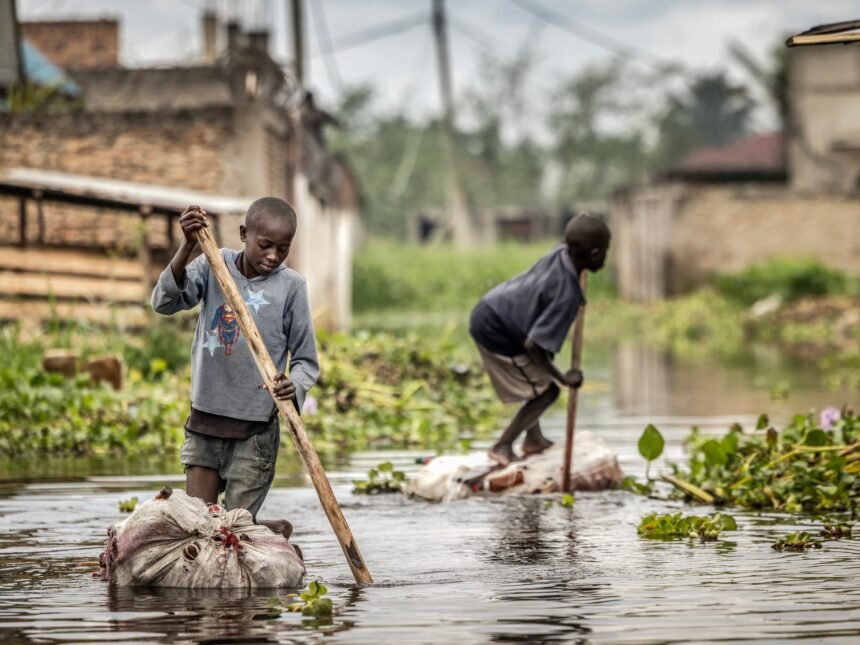Asha, a mother-of-four, discovered herself as soon as once more donning rubber boots inside her lounge – the recurring value of residing close to Lake Tanganyika in Burundi, the place local weather change and relentless flooding have grow to be part of every day life.
The swish structure of Gatumba – a city bordering the capital, Bujumbura – serves as a testomony to its previous prosperity. But for a lot of, that reminiscence feels distant.
More and more, residents resort to pitching tents atop their roofs, as kids drift between houses on makeshift rafts long-established from plastic bottles.
“We’ve been underwater for years,” stated Asha, aged 32.
Lake Tanganyika is thought for its cyclical fluctuations in water stage, however these have been worsened by international warming, in accordance with Bernard Sindayihebura, an city planning and setting specialist on the College of Burundi.
He defined that floor temperatures on Africa’s second-largest lake have climbed steadily, resulting in heavier rainfall and pushing the lake above its historic common since 2018.
With the lake swollen, the Ruzizi River is unable to empty into it, leading to persistent floods that inundate surrounding areas like Gatumba on the northern shore.
The scenario escalated in 2023, when Asha and her household have been pressured to flee a very extreme flood. With water rising as excessive as her waist, she needed to search shelter in momentary lodging close by.
The next 12 months, and once more this 12 months, they have been displaced repeatedly, as floodwaters engulfed complete neighbourhoods.
Burundi ranks among the many world’s poorest nations, standing 187th out of 193 on the United Nations Human Improvement Index. The UN additionally lists it as one of many 20 nations most weak to local weather change.
In 2024, pounding rains, magnified by the El Nino phenomenon, displaced practically 100,000 individuals and claimed quite a few lives, though no official figures have been launched.
Ariella, a mom of seven now residing within the Gateri camp for internally displaced individuals (IDP) in northern Burundi, spoke of shedding all the things within the 2020 Gatumba floods.
Her home collapsed, and considered one of her infants was nearly swept away by the floodwaters. The household moved between two totally different camps, solely to be hit by floods once more.
“We regularly surprise what our future will appear like,” stated Ariella.
In Gatumba, group chief Jean-Marie Niyonkuru, 42, stated residents are doing their greatest to manage, however situations stay dire.
“Youngsters undergo from diarrhoea as a result of the water has blended with bathroom water, flooding the streets,” he stated. “There’s plenty of cholera.”
Save the Youngsters is now interesting for help, however important funding has dried up. Below President Donald Trump, 83 % of United States humanitarian initiatives have been suspended, with climate-related programmes amongst these most in danger.
The US beforehand supplied 40 % of world help, and no different nation has bridged the hole.
